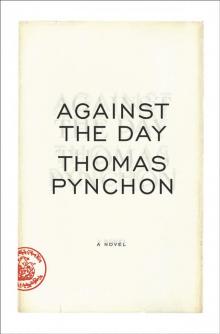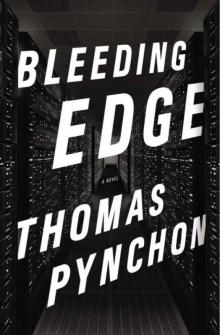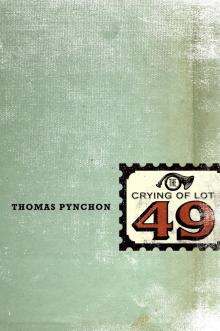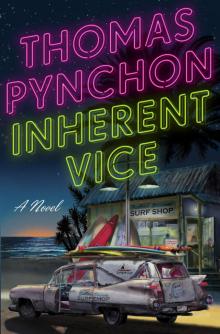- Home
- Thomas Pynchon
Inherent Vice Page 2
Inherent Vice Read online
Page 2
Fucking Bigfoot. Well, wouldn’t you know. On some extrasensory impulse, Doc reached for the tube, switched it on and flipped to one of the off-network channels dedicated to long-ago TV movies and unsold pilots, and sure enough, there was the old hippie-hating mad dog himself, moonlighting after a busy day of civil-rights violation, as pitchman for Channel View Estates. “A Michael Wolfmann Concept,” it read underneath the logo.
Like many L.A. cops, Bigfoot, named for his entry method of choice, harbored show-business yearnings and in fact had already appeared in enough character parts, from comical Mexicans on The Flying Nun to assistant psychopaths on Voyage to the Bottom of the Sea, to be paying SAG dues and receiving residual checks. Maybe the producers of these Channel View spots were desperate enough to be counting on some audience recognition—maybe, as Doc suspected, Bigfoot was somehow duked into whatever the underlying real-estate deal was. Whatever, personal dignity didn’t come into it much. Bigfoot showed up on camera wearing getups that would have embarrassed the most unironical hippie in California, tonight’s being an ankle-length velvet cape in a paisley print of so many jangling “psychedelic” hues that Doc’s tube, a low-end affair purchased in Zody’s parking lot at a Moonlight Madness sale a couple years ago, couldn’t really keep up. Bigfoot had accessorized his outfit with love beads, shades with peace symbols on the lenses, and a gigantic Afro wig striped in Chinese red, chartreuse, and indigo. Bigfoot often reminded viewers of legendary used-car figure Cal Worthington—except where Cal was famous for including live animals in his pitch, Bigfoot’s scripts featured a relentless terror squad of small children, who climbed all over the model-home furniture, performed insubordinate cannonballs into the backyard pools, whooped and hollered and pretended to shoot Bigfoot down, screaming “Freak Power!” and “Death to the Pig!” Viewers were ecstatic. “Those li’l kids,” they would cry, “wow, they’re really something, huh!” No overfed leopard ever got up Cal Worthington’s nose the way these kids did Bigfoot’s, but he was a pro, wasn’t he, and by God he would soldier through, closely studying old W. C. Fields and Bette Davis movies whenever they came on to see what tips he could pick up for sharing the frame with kids whose cuteness, for him, was never better than problematical. “We’ll be chums,” he would croak as if to himself, pretending to puff compulsively on a cigarette, “we’ll be chums.”
There was now sudden hammering on the front door, and briefly Doc flashed that it had to be Bigfoot in person, about to kick his way in once again as in days of old. But instead it was Denis from down the hill, whose name everybody pronounced to rhyme with “penis,” appearing even more disoriented than usual.
“So Doc, I’m up on Dunecrest, you know the drugstore there, and like I noticed their sign, ‘Drug’? ‘Store’? Okay? Walked past it a thousand times, never really saw it—Drug, Store! man, far out, so I went in and Smilin Steve was at the counter and I said, like, ‘Yes, hi, I’d like some drugs, please?’—oh, here, finish this up if you want.”
“Thanks, all’s ’at’ll do ’s just burn my lip.”
Denis by now had drifted into the kitchen and started looking through the fridge.
“You’re hungry, Denis?”
“Really. Hey, like Godzilla always sez to Mothra—why don’t we go eat some place?”
They walked up to Dunecrest and turned left into the honky-tonk part of town. Pipeline Pizza was jumping, the smoke so thick inside you couldn’t see from one end of the bar to the other. The jukebox, audible all the way to El Porto and beyond, was playing “Sugar, Sugar” by the Archies. Denis threaded his way back to the kitchen to see about a pizza, and Doc watched Ensenada Slim working one of the Gottlieb machines in the corner. Slim owned and operated a head shop just up the street called the Screaming Ultraviolet Brain and was a sort of village elder around here. After he’d won a dozen free games, he took a break, saw Doc and nodded.
“Buy you a beer, Slim?”
“Was that Shasta’s car I saw down on the Drive? That big old ragtop?”
“She stuck her head in for a couple minutes,” Doc said. “Kind of weird seeing her again. Always figured when I did, it’d be on the tube, not in person.”
“Really. Sometimes I think I see her at the edge of the screen? but it’s always some look-alike. And never as easy on the eyes, of course.”
Sad but true, as Dion always sez. At Playa Vista High, Shasta made Class Beauty in the yearbook four years running, always got to be the ingenue in school plays, fantasized like everybody else about getting into the movies, and soon as she could manage it was off up the freeway looking for some low-rent living space in Hollywood. Doc, aside from being just about the only doper she knew who didn’t use heroin, which freed up a lot of time for both of them, had never figured out what else she might’ve seen in him. Not that they were even together that long. Soon enough she was answering casting calls and getting some theater work, onstage and off, and Doc was into his own apprenticeship as a skip tracer, and each, gradually locating a different karmic thermal above the megalopolis, had watched the other glide away into a different fate.
Denis came back with his pizza. “I forget what I asked for on it.” This happened at the Pipeline every Tuesday or Cheap Pizza Nite, when any size pizza, with anything on it, cost a flat $1.35. Denis now sat watching this one intently, like it was about to do something.
“That’s a papaya chunk,” Slim guessed, “and these . . . are these pork rinds?”
“And boysenberry yogurt on pizza, Denis? Frankly, eeeww.” It was Sortilège, who used to work in Doc’s office before her boyfriend Spike came back from Vietnam and she decided love was more important than a day job, or that’s how Doc thought he remembered her explaining it. Her gifts were elsewhere, in any case. She was in touch with invisible forces and could diagnose and solve all manner of problems, emotional and physical, which she did mostly for free but in some cases accepted weed or acid in lieu of cash. She had never been wrong that Doc knew about. At the moment she was examining his hair, and as usual he had a spasm of defensive panic. Finally, with an energetic nod, “Better do something about that.”
“Again?”
“Can’t say it often enough—change your hair, change your life.”
“What do you recommend?”
“Up to you. Follow your intuition. Would you mind, Denis, actually, if I just took this piece of tofu?”
“That’s a marshmallow,” Denis said.
BACK AT HIS PLACE AGAIN, Doc rolled a number, put on a late movie, found an old T-shirt, and sat tearing it up into short strips about a half inch wide till he had a pile of maybe a hundred of these, then went in the shower for a while and with his hair still wet took narrow lengths of it and rolled each one around a strip of T-shirt, tying it in place with an overhand knot, repeating this southern-plantation style all over his head, and then after maybe half an hour with the hair dryer, during which he may or may not have fallen asleep, untying the knots again and brushing it all out upside down into what seemed to him a fairly presentable foot-and-a-half-diameter white-guy Afro. Inserting his head carefully into a liquor-store carton to preserve the shape, Doc lay down on the couch and this time really did fall asleep, and toward dawn he dreamed about Shasta. It wasn’t that they were fucking, exactly, but it was something like that. They had both flown from their other lives, the way you tend to fly in early-morning dreams, to rendezvous at a strange motel which seemed to be also a hair salon. She kept insisting she “loved” some guy whose name she never mentioned, though when Doc finally woke up, he figured she must’ve been talking about Mickey Wolfmann.
No point sleeping anymore. He stumbled up the hill to Wavos and had breakfast with the hard-core surfers who were always there. Flaco the Bad came over. “Hey man, that cop was around looking for you again. What’s that on your head?”
“Cop? When was this?”
“Last night. He was at your place,
but you were out. Detective from downtown Homicide in a really dinged-up El Camino, the one with the 396?”
“That was Bigfoot Bjornsen. Why didn’t he just kick my door down like he usually does?”
“He might’ve been thinking about it but said something like ‘Tomorrow is another day’ . . . which would be today, right?”
“Not if I can help it.”
DOC’S OFFICE WAS located near the airport, off East Imperial. He shared the place with a Dr. Buddy Tubeside, whose practice consisted largely of injecting people with “vitamin B12,” a euphemism for the physician’s own blend of amphetamines. Today, early as it was, Doc still had to edge his way past a line of “B12”-deficient customers which already stretched back to the parking lot, beachtown housewives of a certain melancholy index, actors with casting calls to show up at, deeply tanned geezers looking ahead to an active day of schmoozing in the sun, stewardii just in off some high-stress red-eye, even a few legit cases of pernicious anemia or vegetarian pregnancy, all shuffling along half asleep, chain-smoking, talking to themselves, sliding one by one into the lobby of the little cinder-block building through a turnstile, next to which, holding a clipboard and checking them in, stood Petunia Leeway, a stunner in a starched cap and micro-length medical outfit, not so much an actual nurse uniform as a lascivious commentary on one, which Dr. Tubeside claimed to’ve bought a truckload of from Frederick’s of Hollywood, in a variety of fashion pastels, today’s being aqua, at close to wholesale.
“Morning, Doc.” Petunia managed to put a lounge-singer lilt onto it, the vocal equivalent of batting mink eyelashes at him. “Love your ’fro.”
“Howdy, Petunia. Still married to what’s-his-name?”
“Oh, Doc . . .”
On first signing the lease, the two tenants, like bunkmates at summer camp, had tossed a coin for who’d get the upstairs suite, and Doc had lost or, as he liked to think of it, won. The sign on his door read LSD INVESTIGATIONS, LSD, as he explained when people asked, which was not often, standing for “Location, Surveillance, Detection.” Beneath this was a rendering of a giant bloodshot eyeball in the psychedelic favorites green and magenta, the detailing of whose literally thousands of frenzied capillaries had been subcontracted out to a commune of speed freaks who had long since migrated up to Sonoma. Potential clients had been known to spend hours gazing at the ocular mazework, often forgetting what they’d come here for.
A visitor was here already, in fact, waiting for Doc. What made him unusual was, was he was a black guy. To be sure, black folks were occasionally spotted west of the Harbor Freeway, but to see one this far out of the usual range, practically by the ocean, was pretty rare. Last time anybody could remember a black motorist in Gordita Beach, for example, anxious calls for backup went out on all the police bands, a small task force of cop vehicles assembled, and roadblocks were set up all along Pacific Coast Highway. An old Gordita reflex, dating back to shortly after the Second World War, when a black family had actually tried to move into town and the citizens, with helpful advice from the Ku Klux Klan, had burned the place to the ground and then, as if some ancient curse had come into effect, refused to allow another house ever to be built on the site. The lot stood empty until the town finally confiscated it and turned it into a park, where the youth of Gordita Beach, by the laws of karmic adjustment, were soon gathering at night to drink, dope, and fuck, depressing their parents, though not property values particularly.
“Say,” Doc greeted his visitor, “what it is, my brother.”
“Never mind that shit,” replied the black guy, introducing himself as Tariq Khalil and staring for a while, under different circumstances offensively, at Doc’s Afro.
“Well. Come on in.”
In Doc’s office were a pair of high-backed banquettes covered in padded fuchsia plastic, facing each other across a Formica table in a pleasant tropical green. This was in fact a modular coffee-shop booth, which Doc had scavenged from a renovation in Hawthorne. He waved Tariq into one of the seats and sat down across from him. It was cozy. The tabletop between them was littered with phone books, pencils, three-by-five index cards boxed and loose, road maps, cigarette ashes, a transistor radio, roach clips, coffee cups, and an Olivetti Lettera 22, into which Doc, mumbling, “Just start a ticket on this,” inserted a sheet of paper which appeared to have been used repeatedly for some strange compulsive origami.
Tariq watched skeptically. “Secretary’s off today?”
“Something like that. But I’ll take some notes here, and it’ll all get typed up later.”
“Okay, so there’s this guy I was in the joint with. White guy. Aryan Bro, as a matter of fact. We did some business, now we’re both out, he still owes me. I mean, it’s a lot of money. I can’t give you details, I swore a oath I wouldn’t tell.”
“How about just his name?”
“Glen Charlock.”
Sometimes the way somebody says a name, you get a vibration. Tariq was talking like a man whose heart had been broken. “You know where he’s staying now?”
“Only who he works for. He’s a bodyguard for a builder named Wolfmann.”
Doc had a moment of faintheadedness, drug-induced no doubt. He came out of it on paranoia alert, not enough, he hoped, for Tariq to notice. He pretended to study the ticket he was making out. “If you don’t mind my asking, Mr. Khalil, how did you hear about this agency?”
“Sledge Poteet.”
“Wow. Blast from the past.”
“Said you helped him out of a situation back in ’67.”
“First time I ever got shot at. You guys know each other from the place?”
“They were teachin us both how to cook. Sledge still has about maybe a year more in there.”
“I remember him when he couldn’t boil water.”
“Should see him now, he can boil tap water, Arrowhead Springs water, club soda, Perrier, you name it. He the Boilerman.”
“So if you don’t mind an obvious question—you know where Glen Charlock works now, why not just go over there and look him up directly, why hire some go-between?”
“Because this Wolfmann is surrounded day and night with some Aryan Brotherhood army, and outside of Glen I have never enjoyed cordial relations with those Nazi-ass motherfuckers.”
“Oh—so send some white guy in to get his head hammered.”
“More or less. I would of p’ferred somebody a little more convincing.”
“What I lack in al-titude,” Doc explained for the million or so -th time in his career, “I make up for in at-titude.”
“Okay . . . that’s possible . . . I seen that on the yard now and then.”
“When you were inside—were you in a gang?”
“Black Guerrilla Family.”
“George Jackson’s outfit. And you say you did business with who now, the Aryan Brotherhood?”
“We found we shared many of the same opinions about the U.S. government.”
“Mmm, that racial harmony, I can dig it.”
Tariq was looking at Doc with a peculiar intensity, and his eyes had grown yellow and pointed.
“There’s something else,” Doc guessed.
“My old street gang. Artesia Crips. When I got out of Chino I went looking for some of them and found it ain’t just them gone, but the turf itself.”
“Far out. What do you mean, gone?”
“Not there. Grindit up into li’l pieces. Seagulls all pickin at it. Figure I must be trippin, drive around for a while, come back, everything’s still gone.”
“Uh-huh.” Doc typed, Not hallucinating.
“Nobody and nothing. Ghost town. Except for this big sign, ‘Coming Soon on This Site,’ houses for peckerwood prices, shopping mall, some shit. Guess who the builder on it.”
“Wolfmann again.”
“That’s it.”
<
br /> On the wall Doc had a map of the region. “Show me.” The area Tariq pointed to looked to be a fairly straight shot from here eastward down Artesia Boulevard, and Doc realized after a minute and a half of mapreading that it had to be the site of Channel View Estates. He pretended to run an ethnicity scan on Tariq. “You’re, like, what again, Japanese?”
“Uh, how long you been doing this?”
“Looks closer to Gardena than Compton, ’s all I’m saying.”
“WW Two,” said Tariq. “Before the war, a lot of South Central was still a Japanese neighborhood. Those people got sent to camps, we come on in to be the next Japs.”
“And now it’s your turn to get moved along.”
“More white man’s revenge. Freeway up by the airport wasn’t enough.”
“Revenge for . . . ?”
“Watts.”
“The riots.”
“Some of us say ‘insurrection.’ The Man, he just waits for his moment.”
Long, sad history of L.A. land use, as Aunt Reet never tired of pointing out. Mexican families bounced out of Chavez Ravine to build Dodger Stadium, American Indians swept out of Bunker Hill for the Music Center, Tariq’s neighborhood bulldozed aside for Channel View Estates.
“If I can get ahold of your prison buddy, will he honor his debt to you?”
“I can’t tell you what it is.”
“No need.”
“Oh and the other thing is I can’t give you nothin in front.”
“Groovy with that.”
“Sledge was right, you are one crazy white motherfucker.”
“How can you tell?”
“I counted.”
TWO
DOC TOOK THE FREEWAY OUT. THE EASTBOUND LANES TEEMED with VW buses in jittering paisleys, primer-coated street hemis, woodies of authentic Dearborn pine, TV-star-piloted Porsches, Cadillacs carrying dentists to extramarital trysts, windowless vans with lurid teen dramas in progress inside, pickups with mattresses full of country cousins from the San Joaquin, all wheeling along together down into these great horizonless fields of housing, under the power transmission lines, everybody’s radios lasing on the same couple of AM stations, under a sky like watered milk, and the white bombardment of a sun smogged into only a smear of probability, out in whose light you began to wonder if anything you’d call psychedelic could ever happen, or if—bummer!—all this time it had really been going on up north.

 Mason & Dixon
Mason & Dixon Against the Day
Against the Day Uncollected Works
Uncollected Works Bleeding Edge
Bleeding Edge Gravity's Rainbow
Gravity's Rainbow The Crying of Lot 49
The Crying of Lot 49 V.
V. Inherent Vice
Inherent Vice Vineland
Vineland